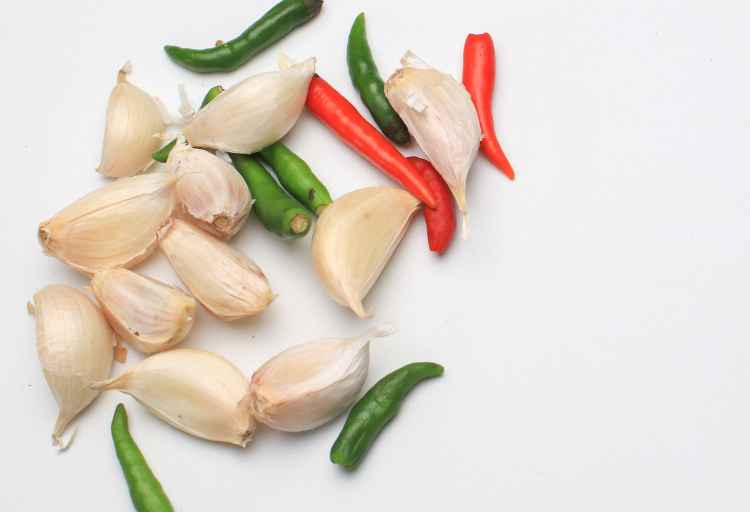Substitute For Garlic Pepper
Substitute For Garlic Pepper: There are several alternatives that can give your recipes a similar kick. One option is to combine garlic powder and black pepper in equal amounts. This mixture will provide the savory taste of garlic along with the heat of black pepper.
Another option is to use onion powder and red pepper flakes for a slightly different flavor profile. If you prefer something spicier, try using paprika and cayenne pepper instead. Italian seasoning or lemon pepper seasoning can also be used as substitutes, depending on the dish you’re preparing.
So don’t worry if you run out of garlic pepper – these substitutes will ensure that your meals remain deliciously seasoned!

Key Takeaways
- Garlic powder and black pepper can be combined in equal amounts to mimic the taste of garlic pepper.
- Onion powder and red pepper flakes offer a slightly different flavor profile as a substitute for garlic pepper.
- Paprika and cayenne pepper can add a spicy kick as an alternative to garlic pepper.
- Italian seasoning is a versatile blend of herbs and spices that can enhance the flavor of dishes as a substitute for garlic pepper.
What is the Substitute For Garlic Pepper?
1. Garlic Powder and Black Pepper
If you’re looking for a substitute for garlic pepper, you can try using a combination of garlic powder and black pepper to add an extra layer of depth and complexity to your dishes.
Garlic powder is made from dried and ground garlic cloves, giving it a concentrated flavor that’s similar to fresh garlic but less pungent. Black pepper, on the other hand, adds a hint of spiciness and earthiness to your dishes.
To create this substitute, simply mix equal parts garlic powder with black pepper. For example, if a recipe calls for one teaspoon of garlic pepper, use half a teaspoon each of garlic powder and black pepper instead. This combination will provide the same aromatic qualities as garlic pepper without the added salt or heat.
If you prefer a milder alternative, you can also try using a blend of roasted garlic and cracked black pepper. Roasted garlic has a sweeter and nuttier flavor compared to raw garlic, while cracked black pepper adds texture and spice.
To make this substitute, roast whole cloves of garlic until soft and golden brown before mashing them into a paste with cracked black pepper.
Incorporating these substitutes into your recipes will give your dishes the desired garlicky taste with an added kick from the black pepper. Whether you’re making soups, stews, marinades, or rubs for meat or vegetables, these alternatives are sure to elevate the flavors in your cooking.
2. Onion Powder and Red Pepper Flakes
For a burst of flavor, try using onion powder and a sprinkle of red pepper flakes. Onion powder is a versatile ingredient that can add depth and complexity to your dishes.
It’s made by dehydrating onions and grinding them into a fine powder. Not only does it provide a savory taste similar to fresh onions, but it also offers several health benefits.
Onion powder is rich in antioxidants, which can help boost your immune system and reduce inflammation in the body. It’s also low in calories and fat, making it a great option for those watching their weight.
Red pepper flakes, on the other hand, add a spicy kick to any recipe. They’re made from dried chili peppers that have been crushed into small flakes. Besides adding heat to your dishes, red pepper flakes also offer numerous health benefits.
They contain capsaicin, which has been shown to have anti-inflammatory properties and may help with pain relief. Additionally, red pepper flakes may aid in digestion and increase metabolism.
There are many ways you can incorporate these ingredients into your cooking. Use onion powder as a seasoning for meats or vegetables before grilling or roasting them.
Sprinkle red pepper flakes onto pizza or pasta dishes for an extra kick of heat. You can also mix them together with other herbs and spices to create your own unique seasoning blend.
Onion powder and red pepper flakes are excellent substitutes for garlic pepper when you want to enhance the flavor of your dishes. Incorporate them into your recipes to enjoy their delicious taste and reap the benefits they offer for your health too!
3. Paprika and Cayenne Pepper
Get ready to spice up your meals with a fiery combination of paprika and cayenne pepper! These sweet and smoky alternatives will add a burst of flavor to any dish, making it an excellent substitute for garlic pepper.
One option is to use chili powder, which adds heat and depth to your food. It’s made from dried chili peppers that have been ground into a fine powder. With its rich, earthy flavor, chili powder can enhance the taste of meats, vegetables, soups, and even sauces.
Another great alternative is smoked paprika. This spice is made from dried peppers that have been smoke-dried and then ground into a fine powder. It has a distinct smoky aroma and imparts a deep flavor to your dishes.
Smoked paprika pairs well with grilled meats, roasted vegetables, or even sprinkled over deviled eggs for an extra kick.
To incorporate these spices into your cooking routine:
- Sprinkle a pinch of chili powder on roasted potatoes for some zing.
- Mix smoked paprika with olive oil and brush it onto the chicken before grilling.
- Add both spices to homemade tomato sauce for an extra layer of complexity.
So don’t worry if you run out of garlic pepper; just reach for the trusty combination of paprika and cayenne pepper! Your taste buds thank you for the fiery adventure they’re about to embark on!
4. Italian Seasoning
Transport your taste buds to Italy with the aromatic blend of Italian seasoning. This versatile mix of herbs and spices is a fantastic substitute for garlic pepper. With its bold flavors, Italian seasoning can elevate any dish to new heights.
Whether you’re cooking pasta, pizza, or even roasted vegetables, this flavor enhancer has got you covered.
Italian seasoning typically includes a combination of dried herbs such as basil, oregano, thyme, and rosemary. Each herb brings its unique aroma and taste to the mix.
The earthiness of rosemary pairs perfectly with the sweetness of basil and the slight tanginess of oregano. Together, they create a symphony of flavors that will make your mouth water.
To use Italian seasoning as a substitute for garlic pepper, simply sprinkle it over your desired dish during cooking or add it directly to sauces and marinades. Its robust flavor profile adds depth and complexity without overpowering other ingredients.
Not only does Italian seasoning provide an excellent alternative to garlic pepper in terms of taste, but it also offers additional health benefits. Many of the herbs found in this blend contain antioxidants and anti-inflammatory properties that can support overall well-being.
So why not give your dishes an Italian twist? Embrace the zesty goodness of Italian seasoning as a flavorful substitute for garlic pepper—your taste buds will thank you!
5. Lemon Pepper Seasoning
Indulge in the vibrant flavors of lemon pepper seasoning and let it awaken your taste buds to a world of tangy citrus and subtle heat.
When comparing lemon pepper seasoning to garlic pepper, you’ll notice a distinct difference in flavor profiles. While garlic pepper brings a robust and savory taste with hints of garlic, lemon pepper offers a refreshing twist with its zesty lemon notes and mild spice.
Lemon pepper seasoning is incredibly versatile and can be used in various creative ways to enhance your dishes.
Sprinkle it on grilled chicken or fish for a burst of citrusy goodness, or mix it into marinades and dressings for added depth. For an extra kick, try adding lemon pepper to roasted vegetables or even popcorn for a unique twist on traditional snacks.
But the possibilities don’t stop there! Get creative by incorporating lemon pepper into your homemade dips, such as hummus or guacamole, to give them a tangy twist. You can also use it as a dry rub for meats before grilling or baking, infusing them with bright flavors that’ll leave you craving more.
So whether you’re looking for an alternative to garlic pepper or simply want to explore new tastes, give lemon pepper seasoning a try. With its tantalizing blend of citrus and spice, it’s sure to elevate any dish and ignite your culinary creativity.
Conclusion
So there you have it, a variety of substitutes for garlic pepper that you can use in your cooking. Whether you choose to use garlic powder and black pepper, onion powder and red pepper flakes, paprika and cayenne pepper, Italian seasoning, or lemon pepper seasoning, each option will add a unique flavor to your dishes.
Experiment with these substitutes to find the perfect combination that suits your taste buds.
